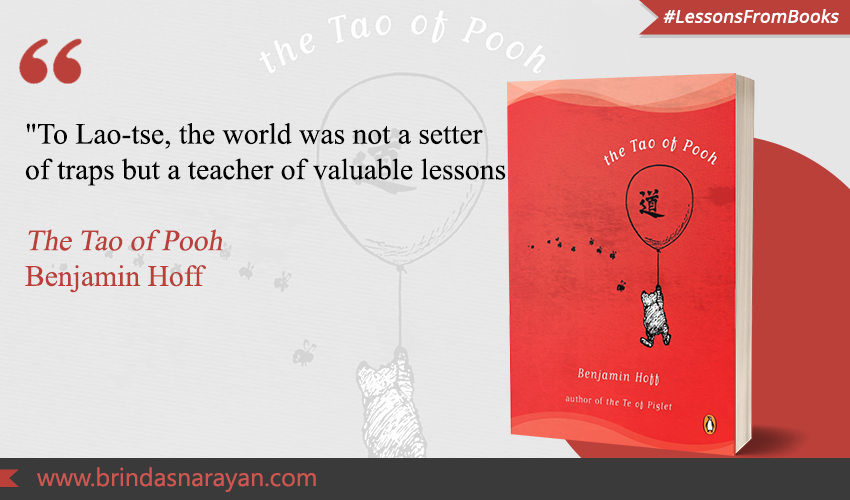
Dipping Into Taoist Wisdom with Winnie the Pooh
At times, it’s fun to return to an old book. And the kind of book, that oddly enough, might be better understood by those that don’t read it. Or best understood by those that don’t read anything at all.
After all, Benjamin Hoff’s delightful recap of the Tao Te Ching, an ancient Chinese text that is deemed to have been written by the scholar Lao Tse (or Lao Tzu), warns us about the dangers of being too Clever or merely stuffed up with Knowledge. Since the book was a runaway bestseller when published in 1982, I’m assuming that some readers are already familiar with it. For those who haven’t waded into the seemingly simple but deeply profound The Tao of Pooh, this is possibly a cheery and effortless way to encounter the Chinese original: through A.A Milne’s already-popularized characters of Winnie the Pooh, Piglet, the Owl, Eeyore and Christopher Robin.
Taoism Versus Other Traditions
Declaring that someone who is “simple minded is not stupid,” Hoff turns Pooh into a model of sorts. A bear who is unabashed about being himself, and who is hence closer to his Inner Nature. In general, the author makes a distinction between Taoism, Buddhism and Confucianism. Using a painting titled The Vinegar Tasters to illustrate this, he says three men have dipped their fingers in a vat of vinegar, and are tasting the contents. One man wears a sour expression, another looks bitter while a third exudes contentment. How could the same vinegar evoke such different responses?
The men represent three different Chinese philosophical systems. The sour man is K’ung Fu Tse or Confucius. He believes that the earth inadequately represents the conditions of heaven, and hence requires an intermediary (the Emperor) to impose order through ancestor worship and other rigorous rituals. Confucius is so exacting about the way everything needs to be done, spouting annoying diktats like: “If the mat was not straight, the Master would not sit.”
The bitter expression belongs to the Buddha, who said the earth is filled with suffering and distasteful desires that need to be transcended. Happiness is to be acquired by not getting too entangled in the bitter muck of reality.
And then there is the blithe Lao Tse, who suggests that Life can be Fun, if one can discern the true nature of everything, including one’s own Inner Nature. According to Taoism, the same laws that govern the Heavens govern the Earth, and we only suffer when we intervene with a Natural and Universal Harmony. In general, one ought to discover one’s own essence and the natural laws of the planet in order to live a relatively carefree life.
Pooh As a Taoist Model
Pu, represented by Pooh, is the Uncarved Block – or things as they are meant to be. Intervening in violent ways with one’s surroundings and oneself evokes disharmony and displeasure. Hence Lao Tse smiles when tasting sour or bitter vinegar, because even in seemingly disturbing circumstances, he finds worthwhile lessons. Real knowledge, of course, cannot be described by words. “Pooh can’t describe the Uncarved Block to us in words; he just is it. That’s the nature of the Uncarved Block.”
While self-assured and secure Pooh doesn’t claim to be Clever or Knowledgeable, Hoff depicts the Taoist dismissal of the intelligent or scholarly through the characters of
- Rabbit who has “Knowledge for the sake of being Clever”
- Eeyore who has “Knowledge for the sake of Complaining About Something.”
- Owl who has “Knowledge for the sake of Appearing Wise.”
Rabbit, Eeyore and Owl are too grandiose or uptight to notice the beauty of simple things: like walking through a park, or wading inside a river, or listening to bird song. Pooh or the Uncarved Block, on the other hand, can relish the “simple and the quiet,” “the natural and the plain.” Such people can engage with Life and the World with a spontaneity that others find difficult to muster.
Moreover, the Owl is a dry, fusty scholar, someone who writes ponderous papers that are circulated among an elite group, or texts that are of little value to others. Then there is the familiar dichotomy between experiential knowledge and theoretical knowledge. “To the Dessicated Scholar, putting names on things is the most vital activity in the world. Tree. Flower. Dog. But don’t ask them to prune the tree, plant the flower, or take care of the dog, unless you enjoy Unpleasant Surprises.” Long before the circulation of a familiar joke: “How many electrical engineers does it take to change a light bulb” – the Taoists were already attuned to the costs of too much theory, and too little practice.
Go With The Flow
More recently, in India, there has been a Cadbury Bournvita ad about not trying to force-fit kids into careers that are not in synch with their natural selves. Pu or Pooh might have lauded such a message. Because as he puts it, “A fly can’t bird, but a bird can fly.” Or in other words, a lot of people waste time trying to fit “square pegs into round holes.” But knowing what the right “package” or “career” is requires introspection: quiet time and space to understand one’s limitations. Accepting what you can and can’t do, which might morph as you age, is essential to leading a Pooh life. It’s Wu Wei or going with the flow, rather than trying to resist your inner currents. The Wise “work with what they’ve got and do what they can do.”
References
Benjamin Hoff, The Tao of Pooh, Penguin Books, 1982




